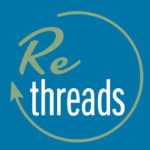The following article originally appeared on a blog called Small Acts Count. The author, Heather, is Betty’s newest volunteer and Zero Waste Warrior. We are so excited to be working with Heather and encourage you to check out her initiative and other blog posts at www.smallactscount.org.
Guess what your fish dinner had for lunch

The warm sun beams down on my face contrasting the frigid wind that whips across, chilling me almost down to the bone. I walk along the sidewalk toward Jefferson Park Avenue to the blue USPS box that’s waiting to injest a birthday card for one of the sweetest, kindest women I have ever met.
A plastic bag clings to the end of a small branch protruding out onto the sidewalk form a lowly bush. I remove it from its entanglement and put it in my pocket where it will safely rest until I return home, and add it to my mound of recyclables waiting to be sorted. I’m pretty sure it’s the same plastic bag I saw earlier in the day and hoped someone would rescue from the streets.
As I pick up the bag I am reminded of the Better World Betty Bingo Night out at the Charlotesville EcoVilliage the previous night. When we finished up our last round of Valentine’s themed bingo, and the chalky sweet heart candies were cleared from our cards, we began an engaging discussion about fish in the ocean and their latest dirty roommate.
About the fish…
The ocean is home to approximately 800 million tons of fish. It is also now the home to somewhere between 100 and 150 million tons of plastic. The rate of plastic being pumped into the oceans is about 20 million tons a year. Currently, plastic is on track to outweigh the fish in the world’s oceans.
Photography by NOAA
These are quite daunting statistics. Especially if you ever vacation to remote beaches or eat fish. Most of these plastics measure less than 5 millimeters. They’re mistaken for plankton or other food, and swallowed by small fish who are eaten by larger fish, which are eaten by us. Plastic can be fatal to marine life, some of which are endangered species. There are negative impacts to tourism and fishermen on top of the toxins that are leaking into the ocean (and fish eating them) as a result of the plastics breaking down into smaller and smaller pieces.
The bulk of this plastic pollution is accumulating in the Pacific Ocean in what’s known as the Great Pacific Garbage Patch. Roughly 80% of this trash is coming from activities on land in America and Asia. If we don’t change our habits its going to continue to get bigger as plastic becomes cheaper and cheaper to produce while more and more consumption and waste of these plastics takes place.
So what can we do about it?
The millions of tons of garbage floating in the ocean might seem daunting, but the most important action we can take at this point is preventing the growth of that patch. We can do this by practicingSmall Acts, which will ultimately lead to a change in our plastic use habits. With the help of my fellow Zero Waste Warriors last night, we came up with a few Small Acts you can practice to easily and feasibly reduce your plastic waste.

- Reduce. Consider, alternative products that don’t use plastic packaging or consider whether you really need that product in the first place. A key is re-training your brain. If it’s plastic, and you need it, ask yourself, “am I going to be able to reuse or recycle this?” If not, consider an alternative. The best option is buying less stuff.
- Bulk section. Buying items, such as dried beans, in bulk is a great way to reduce plastic packaging. Just bring in a mason jar to your local store that sells bulk food, get them to weigh the jar first and record the weight, then fill it up!
- Reusable bottles or mugs. You can actually save money this way. Many coffee shops will give you a small discount if you use a reusable mug. Reusable water bottles save you money because you can bring your own water from home!
- Reusable grocery bags. Cut down on plastic bags by carrying reusable cloth bags. Hang them by the door if you have trouble remembering to take them.
- Reusable to-go containers. Half of my kitchen Tupperware is plastic to-go containers, which saved me from having to buy more.
Finally, and probably most obviously, recycle! If you don’t already, this is a major one. A huge contribution to plastic waste is not properly disposing of plastics.
How convenient is that?
The greatest hurdle I think we face, as was stated by one of the other meeting attendees last night, is our mindset on instant gratification and convenience. It’s inconvenient to remember to take a reusable water bottle or reusable grocery bag. What do we do when we forget? We just use a plastic bag or buy a plastic bottle filled with water because it’s more convenient.
An even Smaller Act, but perhaps more challenging, is shifting our perception about convenience. Convenience now can mean a much greater inconvenience in our future and the future of the next generation when we are stuck trying to clean up our messes in order to survive on this planet.
Rome wasn’t built in a day. Start small because it counts toward big change.






Comments on this entry are closed.